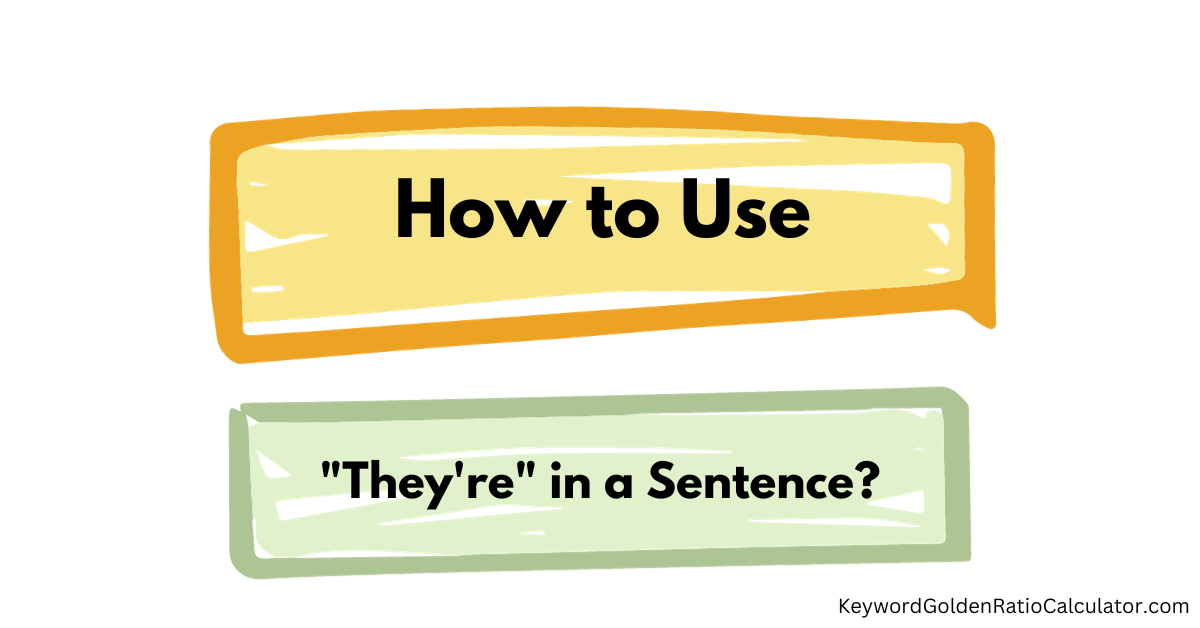When it comes to the English language, homophones – words that sound alike but have different meanings – have always been a source of confusion for learners and even native speakers.
In this blog post, we will focus on one such common pair: “their”, “there” and “they’re”. More specifically, we will be learning to skillfully employ “they’re” in a sentence with examples.
Understanding the Basics: What Does “They’re” Mean?
“They’re” is a contraction of “they are” or “they were.” It is predominantly used in informal writing and spoken English. Let’s take a look at some examples:
- “They’re coming to the party.”
- “I believe they’re wrong in this context.”
Note that “they’re” should only be used when you can equally replace it with “they are” or “they were”.
For instance, in the above examples, you can replace “they’re” with “they are” and the sentence would be perfectly grammatical:
- “They are coming to the party.”
- “I believe they are wrong in this context.”
Common Mistakes with “They’re”
One of the major mistakes people make is replacing “they’re” where the words “there” or “their” should be used.
Each of these homophones has a specific function in a sentence:
“There”
This word often refers to a place or position. In its many grammatical roles, it could:
- Indicate a location: “The book is over there.”
- Function as an introductory word to begin sentences: “There is a solution to this problem.”
“Their”
This is a possessive pronoun, showing ownership or belonging. For example:
- “Their house is beautiful.”
- “She couldn’t find their names on the list.”
Exercises to Practice Using “They’re” Correctly
The best way to get the hang of using “they’re” correctly is through practice. Therefore, let’s indulge in a few exercises:
- At the cinema
“____ excited about the new Marvel movie!”
Correct answer: “They’re” (because it can be replaced with “they are”) - At the football match
“Our team is losing. ____ playing terribly.”
Correct answer: “They’re” (because it can be replaced with “they are”) - Talking about friend’s cats
“____ cats are so cute!”
Correct answer: “Their” (because we are talking about possession/ownership)
As we continue practicing with more sentences, understanding when to use “they’re” becomes easier and instinctive.
Identifying Misuses of “They’re”
Whilst using “they’re”, a quick self-check technique involves mentally replacing it with “they are” in the sentence. If it fits, congratulations – you’re using it correctly!
Misuse of “they’re” usually surfaces when it’s used in place of “there” or “their”. For example,
“They’re is no hope left.” This is incorrect as the correct usage should be “There is no hope left.”
“Remember, ‘They’re’ should always be interchangeable with ‘they are’.”
Conclusion: Perfecting Your Use of “They’re”
English homophones can be a tricky business, but a clear understanding paired with consistent practice can conquer this battleground.
Keep testing yourself with the ‘they are’ interchangeability trick, and in no time, mastering the use of “they’re” will be another feather in your language expertise cap.
Let’s eliminate those small but impactful errors from our writing – Trust me, they’re worth the effort!
So, start practicing now, and remember: They’re (they are, in this context), not their, and definitely not there!
FAQs About How to Use “They’re” in a Sentence?
What does “they’re” mean?
“They’re” is a contraction of the words “they” and “are”. It’s often used in informal speaking and writing.
How can you correctly use “they’re” in a sentence?
As a contraction of “they” and “are”, “they’re” can be used to describe more than one person, place, or thing. For example, “They’re going to the park.” Here, “they’re” is referring to multiple people going to the park.
Can “they’re” be used to refer to a single person or thing?
Yes, “they’re” can refer to a single person when their gender is unknown or when referring to someone who prefers gender-neutral pronouns. For example, “If a student needs help, they’re free to ask questions.”
What’s the difference between “they’re”, “there” and “their”?
“They’re” is a contraction of “they” and “are”. “There” refers to a place or the existence of something. “Their” is a possessive pronoun referring to something owned by a group. Each word has a distinct usage, and they’re not interchangeable.
Can ‘they’re’ begin a sentence?
Yes, you can start a sentence with “they’re.” For example, “They’re the best players on the team.”
Can ‘they’re’ be used in a sentence without mentioning the subject beforehand?
Generally, the subject comes before “they’re”. However, if the context makes it clear who or what “they’re” refers to, it can be used without mentioning the subject beforehand.
When should I avoid using “they’re”?
You should avoid using “they’re” in formal writing because it’s a contraction. Instead, use “they are.”
Can I use “they’re” with an adverb?
Yes, you can use “they’re” with an adverb. For example, “They’re happily playing in the park.”
Is the usage of ‘they’re’ in English grammar considered correct?
Yes, “they’re” is correct in English grammar, as long as it’s used in the right context to mean “they are.”
How can I practice using “they’re” correctly?
The best way to practice using “they’re” is through reading and writing. By constantly seeing and using “they’re” in sentences, you will become more comfortable with its uses and rules.

